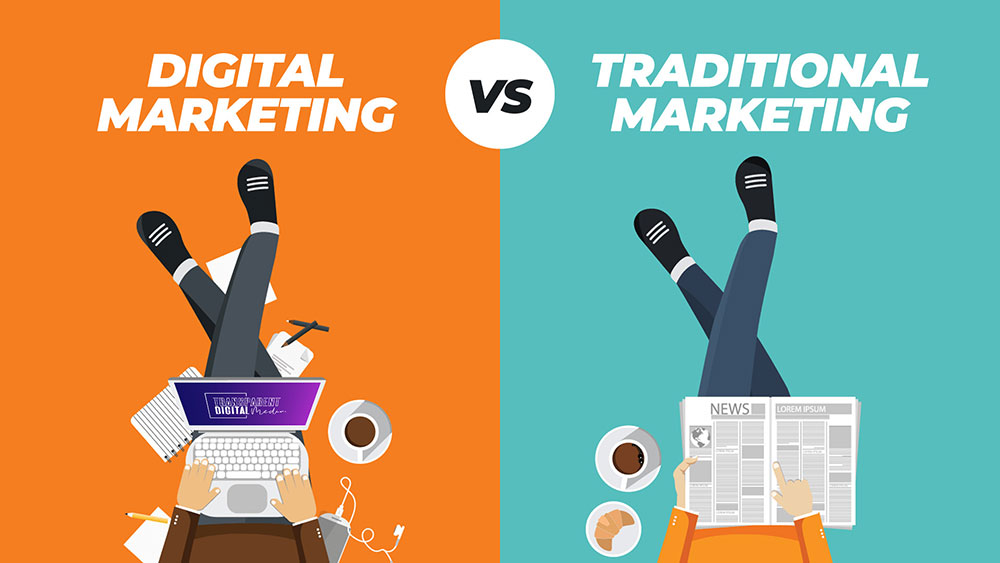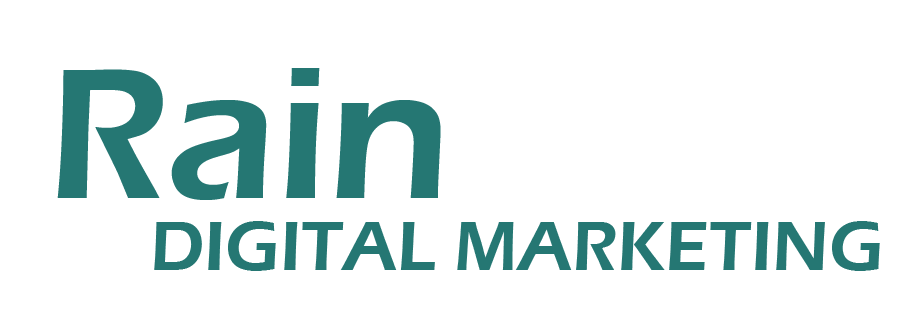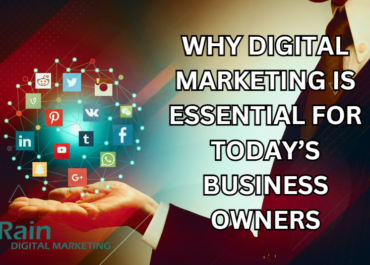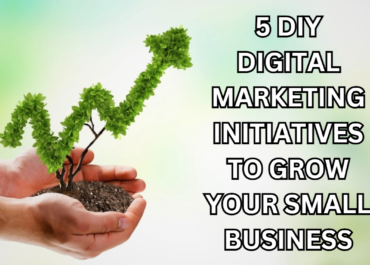Why Digital Marketing Trumps Traditional in 2024

As we step into 2024, the transformative power of digital marketing has unequivocally asserted its dominance over traditional marketing methodologies.
The dynamic and ever-evolving landscape of the business world has witnessed a paradigm shift, where digital marketing has not only surpassed but also revolutionized the way brands connect with their audiences.
In an era defined by technological advancements, data-driven insights, and instantaneous communication, the efficacy of digital marketing stands out prominently against the backdrop of traditional approaches.
The dawn of 2024 marks a clear turning point, where businesses are increasingly recognizing the unparalleled advantages of digital channels in terms of reach, precision targeting, real-time engagement, cost-effectiveness, and measurable returns on investment.
As we delve into the nuances of this digital era, it becomes evident that the strategic integration of digital marketing strategies is not merely an option but an imperative for businesses striving to thrive in an ever-competitive marketplace.
Join us today as we dive further into the many ways the digital marketing field is proving to be more effective in today’s fast paced world.
Digital VS Traditional
Digital marketing has emerged as a powerful force in the business landscape, outpacing traditional marketing methods in several key aspects.
Traditional marketing tactics, over the years, have proven themselves to be an indispensable component of the business world. Yet, as that world continues to change and develop around us, so too must our methods of outreach and promotion.
This is where digital marketing helps to, not only fill the gap, but in many instances, surpass its predecessor.
How, you might ask? Let’s take a look:
1: Digital marketing provides unparalleled reach and accessibility.
Digital marketing has emerged as a formidable force in the business realm, primarily owing to its unparalleled reach and accessibility.
Unlike traditional marketing methods, which often require significant financial investments to access broader audiences through mediums like television or print media, digital marketing leverages the vast expanse of the internet.
Platforms such as social media, search engines, and email transcend geographical boundaries, enabling businesses to connect with a global audience almost instantaneously.
This level of reach not only democratizes the marketing landscape but also allows businesses of all sizes to tap into a vast pool of potential customers without the constraints of physical barriers. (… More on that later.)
The inherent accessibility of digital marketing further distinguishes it from traditional counterparts.
You see, in the digital realm, consumers are constantly connected, accessing information on various devices throughout their daily lives.
Businesses can capitalize on this accessibility by strategically placing their marketing messages where their target audience spends the most time – be it on social media feeds, search engine results, or in their email inboxes.
This omnipresence ensures that brands are within arm’s reach of their audience, fostering a continuous and interactive relationship that transcends the limitations of traditional marketing channels.
Moreover, the interactive nature of digital marketing contributes to its enhanced accessibility.
Through various online channels, businesses can engage with their audience in real-time, responding to queries, providing instant information, and fostering a sense of community. This instantaneous and two-way communication not only strengthens brand-consumer relationships but also allows for immediate adjustments to marketing strategies based on user feedback, a level of agility that traditional marketing struggles to achieve.
In 2024, the digital landscape stands as a testament to the unprecedented reach and accessibility that businesses can harness to propel their brand presence and engagement to new heights.
2: Digital marketing offers opportunities for precise targeting and personalized messaging.
Digital marketing has redefined the game by offering businesses unparalleled opportunities for precise targeting and personalized messaging.
Unlike traditional marketing methods that often rely on mass communication to broad audiences, digital platforms enable marketers to leverage sophisticated tools and analytics to understand their audience at a granular level.
Through data analytics and user insights, businesses can precisely identify their target demographics, understanding their preferences, behaviors, and interests.
Such precision allows for the creation of highly targeted campaigns that resonate with specific audience segments, maximizing the impact of marketing efforts.
You see, one of the key strengths of digital marketing lies in its ability to deliver personalized messaging to individual users.
Through the collection and analysis of user data, businesses can tailor their marketing content to cater to the unique preferences and needs of each consumer.
Whether through personalized email campaigns, targeted social media ads, or dynamically generated website content, digital marketing enables brands to speak directly to individuals, creating a more meaningful and relevant connection.
This personalized approach not only enhances the customer experience but also significantly improves the chances of conversion, as consumers are more likely to engage with content that aligns with their individual interests.
Furthermore, digital marketing channels provide the flexibility to adapt messaging in real-time based on user interactions and behaviors.
This agility allows marketers to refine their strategies on the fly, ensuring that messages remain relevant and impactful.
The dynamic nature of the online environment means that personalized messaging can be continuously optimized, responding to changing market conditions and consumer preferences.
In 2024, the ability to deliver precisely targeted and personalized content positions digital marketing as a powerful tool for fostering meaningful connections and driving conversions in an increasingly competitive business landscape.
3: Digital marketing allows for real-time feedback and analytics.
Digital marketing’s supremacy over traditional counterparts is distinctly evident in its ability to provide real-time feedback and analytics, a facet that has revolutionized the marketing landscape.
Unlike traditional marketing methods, which often require weeks or even months to assess the impact of a campaign, digital marketing offers instantaneous insights into its performance.
Through advanced analytics tools, businesses can track key performance indicators, measure user engagement, and evaluate the success of campaigns in real time.
This rapid feedback loop empowers marketers to make data-driven decisions swiftly, allowing for agile adjustments to strategies for optimal results.
The granularity of analytics in digital marketing is another distinctive feature, enabling businesses to delve deep into the intricacies of consumer behavior.
Marketers can analyze user interactions, track conversion rates, and understand the customer journey on a microscopic level.
This level of detail is a stark departure from the more generalized metrics of traditional marketing, such as television ratings or magazine circulation numbers.
Digital analytics not only provide insights into campaign effectiveness but also offer a comprehensive understanding of the audience, enabling marketers to refine and optimize their strategies continuously.
Moreover, the real-time nature of digital marketing feedback fosters a culture of experimentation and innovation.
Marketers can test various elements of a campaign – from ad creatives to audience targeting – and promptly assess which strategies yield the best results.
This iterative approach to marketing allows for continuous improvement and optimization, a luxury not afforded by traditional methods with longer feedback cycles.
In 2024, digital marketing’s ability to deliver instant, detailed feedback and analytics stands as a testament to its efficiency and effectiveness in navigating the ever-evolving dynamics of the modern business landscape.
4. Digital marketing offers a level playing field for businesses of all sizes.
Digital marketing has emerged as the great equalizer in the business realm, leveling the playing field for businesses of all sizes in stark contrast to traditional marketing methods.
Unlike the hefty budgets required for prime-time television slots or full-page magazine ads, digital marketing offers cost-effective alternatives that are accessible to businesses with limited financial resources.
Platforms such as social media, search engines, and email provide affordable yet powerful avenues for small and medium-sized enterprises (SMEs) to establish a robust online presence, effectively reaching and engaging with their target audience without the exorbitant costs associated with traditional advertising channels.
In addition, the democratizing effect of digital marketing extends beyond budget considerations.
Online platforms offer businesses the opportunity to compete based on the merit of their content, engagement strategies, and the relevance of their offerings rather than relying solely on financial clout.
Search engine optimization (SEO), content marketing, and social media campaigns can empower smaller businesses to carve out a niche in their respective industries, enabling them to vie for attention on a global scale.
In 2024, the digital landscape continues to redefine competition, ensuring that innovation and strategic prowess are more significant factors than sheer financial muscle in determining a business’s success.
5. Digital marketing’s real-time engagement and interaction opportunities.
Digital marketing’s unparalleled advantage over traditional counterparts lies in its ability to foster real-time engagement and interaction with the audience.
Social media platforms, in particular, have become dynamic spaces where businesses can directly communicate with their customers.
Unlike traditional marketing channels that operate on a one-way communication model, digital platforms enable businesses to listen, respond, and engage in meaningful conversations with their audience.
This direct and immediate interaction builds a sense of community, trust, and loyalty that is challenging to replicate through traditional means.
In the digital realm, campaigns can elicit instant feedback, allowing marketers to gauge audience reactions in real time.
Whether through likes, shares, comments, or click-through rates, businesses can assess the impact of their content promptly.
This real-time feedback loop empowers marketers to adapt their strategies on the fly, making adjustments to content, targeting, or messaging based on audience responses.
This level of agility is a stark departure from traditional marketing campaigns, where feedback is often delayed, hindering the ability to make timely adjustments.
Moreover, digital marketing’s real-time engagement extends beyond social media to include email marketing, live chat, webinars, and other interactive formats.
Through personalized and interactive content, businesses can create immersive experiences for their audience, deepening the connection between the brand and the consumer.
This immediate and two-way communication not only enhances customer satisfaction but also allows businesses to address concerns promptly, building a positive brand image.
In 2024, digital marketing’s real-time engagement capabilities continue to redefine how brands connect with their audience, emphasizing the importance of timely and interactive communication in the ever-evolving digital landscape.
6. Digital marketing’s measurability of return on investment (ROI).
Finally comes the hallmark of digital marketing… The measurability of ROI.
Digital marketing’s standout feature in the modern business landscape is its unparalleled measurability of return on investment (ROI).
Unlike traditional marketing methods, where assessing the impact of a campaign could be challenging and often relied on indirect metrics, digital marketing provides precise and tangible insights into the performance of every aspect of a campaign.
With advanced analytics tools, businesses can track key performance indicators, conversion rates, customer engagement, and other metrics in real time.
This level of granularity enables marketers to measure the success of their campaigns with a high degree of accuracy, ensuring that every marketing dollar spent can be tied back to specific outcomes.
The ability to measure ROI in digital marketing goes beyond just tracking the effectiveness of campaigns; it also allows for continuous optimization and improvement.
Marketers can identify which channels, messages, or strategies are generating the highest returns and allocate resources accordingly.
A data-driven approach enables businesses to refine their marketing strategies based on actual performance, ensuring that efforts are focused on activities that deliver the best results.
This iterative and adaptable nature of digital marketing sets it apart, providing businesses with the tools to make informed decisions and maximize the efficiency of their marketing spend.
In 2024, the measurability of ROI in digital marketing remains a driving force, empowering businesses to make strategic decisions that directly impact their bottom line in a way that traditional marketing struggles to match.
The Wrap Up
The landscape of marketing has undergone a profound transformation, with digital marketing emerging as a formidable force that outshines traditional methods in numerous aspects.
The agility, precision targeting, and real-time engagement afforded by digital marketing provide businesses with unprecedented opportunities to connect with their audience in meaningful ways. The level playing field it establishes, allowing businesses of all sizes to compete on the strength of their strategies rather than sheer financial might, is a testament to its inclusive nature.
Moreover, the measurability of return on investment in the digital realm provides marketers with valuable insights to optimize and refine their campaigns continuously.
While traditional marketing has its merits and may still find relevance in certain contexts, the dynamic and data-driven nature of digital marketing is undeniably more aligned with the fast-paced, technologically driven world we inhabit.
As we navigate the ever-evolving landscape of consumer behavior and market trends, businesses that embrace the opportunities presented by digital marketing are likely to find themselves not only surviving but thriving in the competitive marketplace of 2024 and beyond.
P.S. If you’d like help getting your business’s digital marketing campaign underway, then Rain Digital wants to hear from you!
Our team is here to help make your business’s promotional strategy a success, and our years of experience and education will allow us the opportunity to do just that.
Let the world know the great things you have to offer by getting the world out with a little help from Rain Digital.









